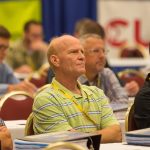Since mid-March 2020, visitor restrictions have been in place in Wisconsin nursing homes and nationwide. Visitor restrictions were put in place to help mitigate and prevent the spread of COVID-19. DHS recognizes the importance of social distancing to help keep residents safe. DHS also acknowledges the unintended consequences of prolonged physical separation and isolation on a resident’s overall health and well-being. Although technology can help decrease loneliness for some residents, technology is not a sustainable substitute for human interaction via in-person visitation. This is especially true for residents with cognitive impairments, visual and/or hearing difficulties, and mobility limitations as they struggle to maintain connections with loved ones, and maintain life-sustaining function, in some cases.
Recognizing the critical role family members and other close friends have in the support of residents and recognizing how they advocate for the resident, DHS recommends that nursing homes develop a process to designate certain individuals as Essential Visitors (EV) where appropriate. An EV could be a husband, wife, daughter, son, other family member, partner or friend who was previously actively engaged with the resident by regularly visiting and providing companionship and love. An EV is different than a regular visitor, or someone who comes into the facility to provide services. An EV is a person who the resident see regularly and depends on for emotional support. Nursing homes are not required to implement an EV program, but the guidance provides recommendations for those facilities that choose to do so.
DHS will regularly monitor the effect Essential Visitors (EV) are having on the disease activity in nursing homes and will adjust the EV guidance accordingly. Because the pandemic is affecting communities in different ways, facilities should use their best clinical judgement, work with the Local/Tribal Public Health Departments (LPHD), regularly monitor visitations, and adjust their EV program as necessary.
Nursing homes should ensure residents, and their loved ones, have access to the Ombudsman Program at the Board on Aging and Long Term Care at 1-800-815-0015. For information regarding outdoor visitation, refer to Outdoor Visitation Guidance for Nursing Homes. For information on general visitation, refer to Visitors to Facilities.
Testing Consent Forms
Please note that the testing consent forms found in Testing Criteria have recently been updated:
- COVID-19 Testing: Resident/Patient/Client Consent, F-02658A
- COVID-19 Testing: Staff Consent, F-02658
Webinars
Weekly webinars and slides shared are posted under Resources.



